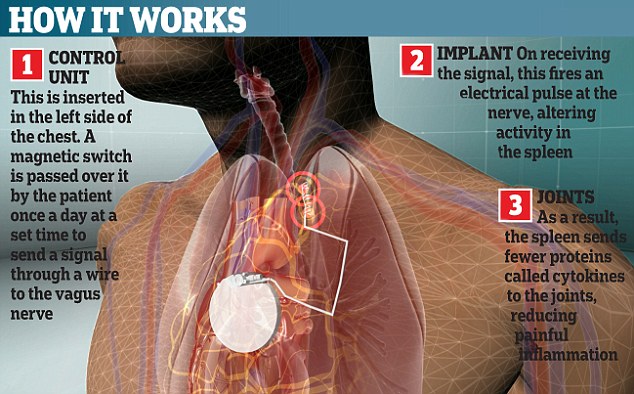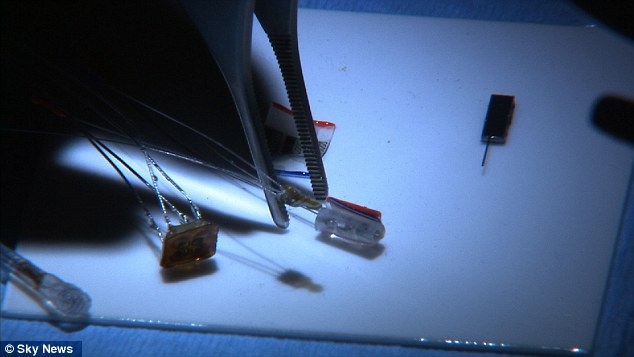A tiny disc planted under the skin could offer a revolutionary rheumatoid arthritis treatment and reduce crippling joint pain.
Tiny disc planted under the skin changes signals from body's nervous system to reduce inflammation.
The device, the size of a 50p coin, modifies signals from the body’s nervous system to reduce inflammation caused by the auto-immune disease.
Early trials are said to have changed the lives of patients who were virtually immobilised by pain.
- Tiny disc planted under skin could offer new rheumatoid arthritis treatment
- Device, the size of a 50p coin, modifies signals from the nervous system
- This can reduce inflammation caused by the auto-immune disease
- Early trials have changed lives of patients virtually immobilised by pain
- One sufferer said she felt 'no pain' within six weeks of being given implant
Scientists used the implant to fire electrical pulses at a key nerve, allowing them to ‘hack’ into the nervous system.
The breakthrough offer hopes to the 400,000 patients in Britain affected by rheumatoid arthritis.  Researchers say similar techniques could reverse chronic conditions such as asthma, obesity and diabetes – and eliminate the need for medication, Sky News reported.
Researchers say similar techniques could reverse chronic conditions such as asthma, obesity and diabetes – and eliminate the need for medication, Sky News reported.
By altering nervous signals, scientists believe they can influence the levels of hormones and antibodies produced by the body’s organs – bypassing the need to alter them with drugs.
Professor Paul-Peter Tak, who carried out the trial at the Academic Medical Centre in Amsterdam, said:
‘Even in patients who have failed everything we have seen a clear trend of improvement. We may be able to achieve remission in 30 per cent of patients, which would be a huge step.’
Twenty volunteers had the control unit implanted in the chest below the collar bone. A wire runs from the unit to an implant attached to the vagus nerve in the back of the neck.
Doctors hope the nerve stimulator could be widely used within a decade, though they admit they do not fully understand its powerful effect.
The wire stimulates the nerve, which connects the brain to major organs and regulates key body functions such as breathing and heart rate.
Once a day, the patient uses the device by holding a magnetic switch over the control unit for three minutes.
It fires impulses to reduce activity in the spleen, a key organ in the immune system, and make it produce fewer of the chemicals and immune cells that cause abnormal inflammation in patients. Scientists say the only side effect is a change to the voice when the switch is used. Monique Robroek had an implant a year ago after being in so much pain that she struggled to cross a room. Now she takes no medication and is pain free. She said: 'I have my normal life back.'
Monique Robroek had an implant a year ago after being in so much pain that she struggled to cross a room. Now she takes no medication and is pain free. She said: 'I have my normal life back.'
'Within six weeks I felt no pain. The swelling has gone. I go biking, walk the dog and drive my car. It is like magic.'
The results are due out next year, but scientists say more than half the patients have made big improvements.
The implant has been developed by pharmaceuticals giant GlaxoSmithKline (GSK), which has invested £32million in bioelectronic technology – medicines using electrical impulses to affect the body’s nerves.
GSK's Kris Famm, who is leading the research, said implants could prevent the airway spasms of asthma, control appetite in obesity, and restore normal insulin production in diabetes.
He said: 'I hope that in 10-20 years if you or I had diabetes, we would go to the doctor and there is an option to introduce this sort of device onto the nerve that controls that balance.
'It becomes your treatment instead of insulin injections or pills.'
Judi Rhys, of the charity Arthritis Care, said: ‘We can only hope this treatment does deliver and reach the hundreds of thousands with rheumatoid arthritis.’
Source: dailymail.co.uk







